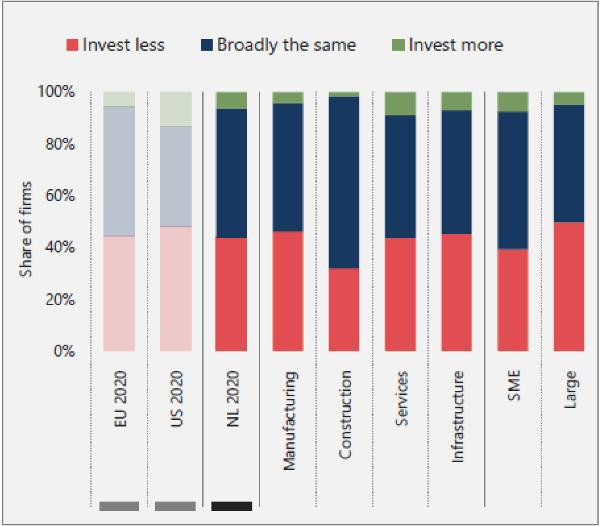A new study by the European Investment Bank (EIB) shows that firms in the Netherlands have few concerns about the long-term effects of climate change. The firms in question say that the main reason for this is that in the recent past they have already invested significantly in climate adaptation or mitigation measures. While firms often state that they expect to see major changes in the climate system, they seem to still lag behind in devising a strategy to deal with them. However, the Netherlands is at the head of the pack in terms of climate investments made so far, according to the EIB’s 2020 Investment Survey.

The study, which was conducted by the EIB’s Economics Department, further indicates that Dutch small and medium-sized enterprises (SMEs) still face barriers in access to financing, especially in the services sector. This is accompanied by a marked decline in investments due to the continuing COVID-19 crisis. The survey, conducted among 480 firms in the Netherlands at the end of 2020, further reveals that around 44% of them expect to invest less in 2021 than in previous years. In this context, a clear distinction should be made between large firms (50%) and SMEs (39%). Furthermore, 32% of firms who had investment plans say they intend to cancel or postpone their plans. The full report can be read on the EIB website.
Kris Peeters, EIB vice-president representing the Benelux countries, said: “The EIB Investment Survey gives a clear picture of the challenges facing firms in the Netherlands today. The pandemic is clearly having an impact on the investment climate, and action is needed both at local and EU level to overcome this uncertainty. A positive aspect is that firms in the Netherlands have already heavily invested in the fight against climate change, but the effects of global warming should not be underestimated, especially in the Netherlands. The EIB will continue to help wherever it can by financing projects that have a positive impact on the climate.”
One area where the Netherlands is clearly ahead of the rest of Europe and the United States is digitalisation. The report indicates, among other things, that firms in the Netherlands are well advanced in integrating innovative technologies, such as artificial intelligence, 3D printing, and the internet of things, into their operations, as compared to their counterparts in the other countries.
Background information:
The European Investment Bank is the EU credit institution for long-term loans. The Bank’s shares are owned by the Member States – the Netherlands holds slightly more than 5% – allowing the Bank to borrow money on the capital market at very favourable rates. The EIB provides long-term financing for solid investments that contribute to the EU policy for sustainable growth, employment and climate. Last year, the EIB made available nearly €2.5 billion for Dutch projects in healthcare, SMEs and energy efficiency. The EIB Investment Survey was conducted among 480 firms in the Netherlands and 12 500 firms across the European Union, as well as a number of firms in the United Kingdom, the United States and China.